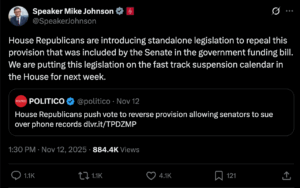Republicans snuck a provision into the recently-passed appropriations bill that would virtually guarantee payouts of a minimum of $500,000 in taxpayer funds to each of eight Republican senators whose phone records were subpoenaed in the government’s investigation into the January 6, 2021 insurrection. Republicans portrayed the funding bill — which ended the nation’s longest government shutdown — as a “clean, non-partisan” funding extension in a November 12 press release in which they bragged that they “restored order” and re-opened government. “Clean” is supposed to mean the bill is free from policy riders and maintains funding at levels from the past year.
But this bill wasn’t “clean” as Republicans claimed.
The provision slipped into the bill lets eight G.O.P. senators sue the government for $500,000 per “violation” for subpoenaing their phone records as part of the investigation into the violent attack Trump supporters carried out at the U.S. Capitol on Jan. 6, 2021. The investigation was managed by longtime prosecutor Jack Smith, the former special counsel assigned by then-Attorney General Merrick Garland

to investigate Trump’s efforts to overturn the 2020 election results.
The eight senators who stand to profit personally from the provision are Lindsey Graham of South Carolina, Marsha Blackburn and Bill Hagerty of Tennessee, Josh Hawley of Missouri, Dan Sullivan of Alaska, Tommy Tuberville of Alabama, Ron Johnson of Wisconsin and Cynthia Lummis of Wyoming, all Republicans.
The provision can be found starting at the bottom of pdf page 224 of the 394-page funding bill (pdf). It makes it a legal violation for the government to fail to notify a senator if their phone records or other metadata was subpoenaed from a phone company or other communications service provider.
The provision specifically states that,
“…any senator whose Senate data, or the Senate data of whose Senate office, has been acquired, subpoenaed, searched, accessed, or disclosed in violation of this section may bring a civil action against the United States if the violation was committed by an officer, employee, or agent of the United States or of any federal department or agency.”
The provision lets the Senators sue the government and is retroactive to 2022. It pertains only to senators and not members of the House of Representatives or ordinary American citizens. The senators can file one lawsuit per claimed “violation” and seek $500,000 per violation. The bill also sharply limits how government can resist such claims, thus hobbling the government’s defense and making it far easier for Republican Senators to prevail in such lawsuits.

The information sought in the investigation was “metadata,” or data about data — specifically what numbers a certain phone called and received calls from, how long the calls lasted, and, if available, the locations the calls were made from. The information sought did not include the contents of any phone conversations.
Obtaining the information was done legally and pursuant to a lawfully-issued subpoena
Jack Smith argues his investigators committed no wrongdoing in obtaining the information, that it was lawfully obtained, done consistent with Department of Justice policies and pursuant to a grand jury subpoena. He argues it was a legitimate, authorized investigative step done was part of an overall effort to try to understand the actions of Trump and his inner circle, not to scrutinize the actions or conversations of the lawmakers themselves.
According to Politico, the provision to personally enrich the eight Senators was negotiated and slipped into the funding bill by Republican Senate Majority Leader John Thune of South Dakota.
After it was discovered, the measure generated bipartisan outrage among legislators in both the Senate and the House, and House Speaker Mike Johnson says he is planning to fast-track a vote this week to strip the provision from the bill.

Honestly speaking. *Way* back in the day, I naively thought that whenever someone opted to run for public office, he or she was simply motivated by a desire to make things better for everyone through “public service”. I’d even thought about doing that in the home town where I grew up . . . While I still believe that some elected officials locally, statewide and nationally are involved by that same type of altruism, it’s very disheartening to witness so much power-grabbing, me-first, “feathering-the-nests of my supporters and myself in order to enrich my re-election chances”.
Let’s hope for a better outcome in the next elections, OK?
This is absurd. Why should they be allowed to sue for $500000 that is $4 million . Vote them out! This is plain old BS.
Hell no.
If you are honest and transparent, you wouldn’t be worried, when information is legally obtained. (nor feel entitled to some sort of restitution) Get over yourself.
You/the others are adults, act like it and stop trying to screw your constituents.
Do your job or get voted out. The public is done with the bulls$!+.